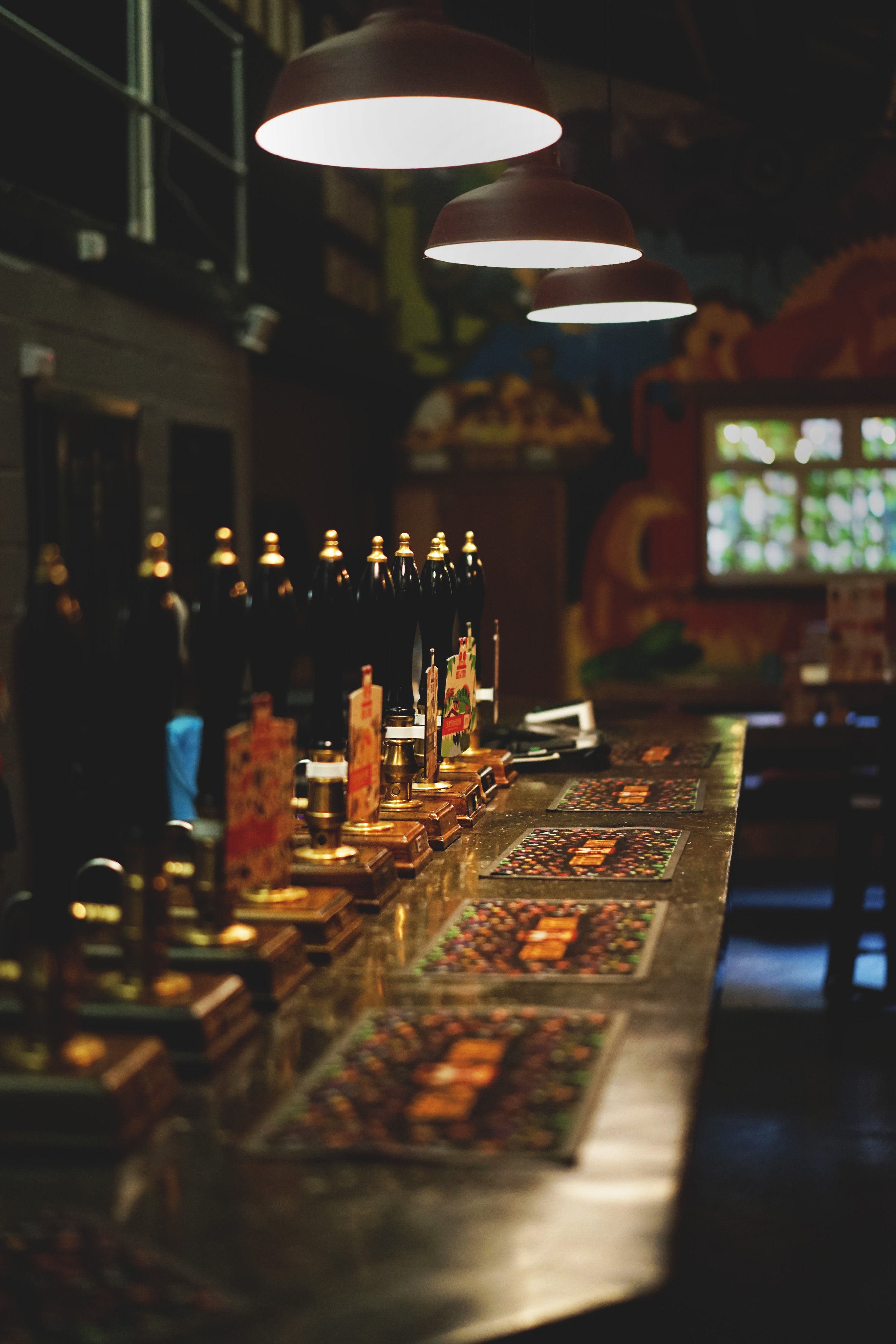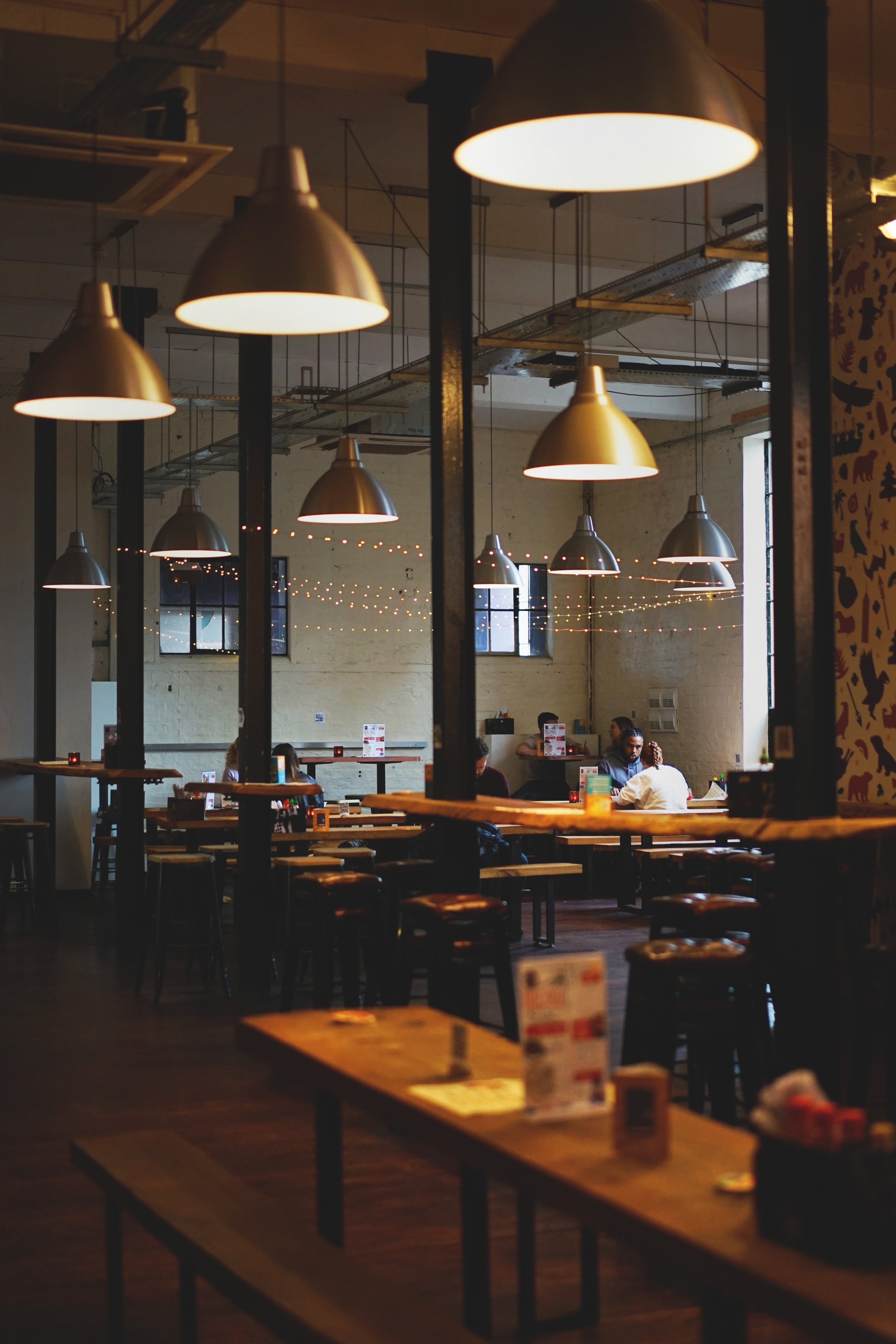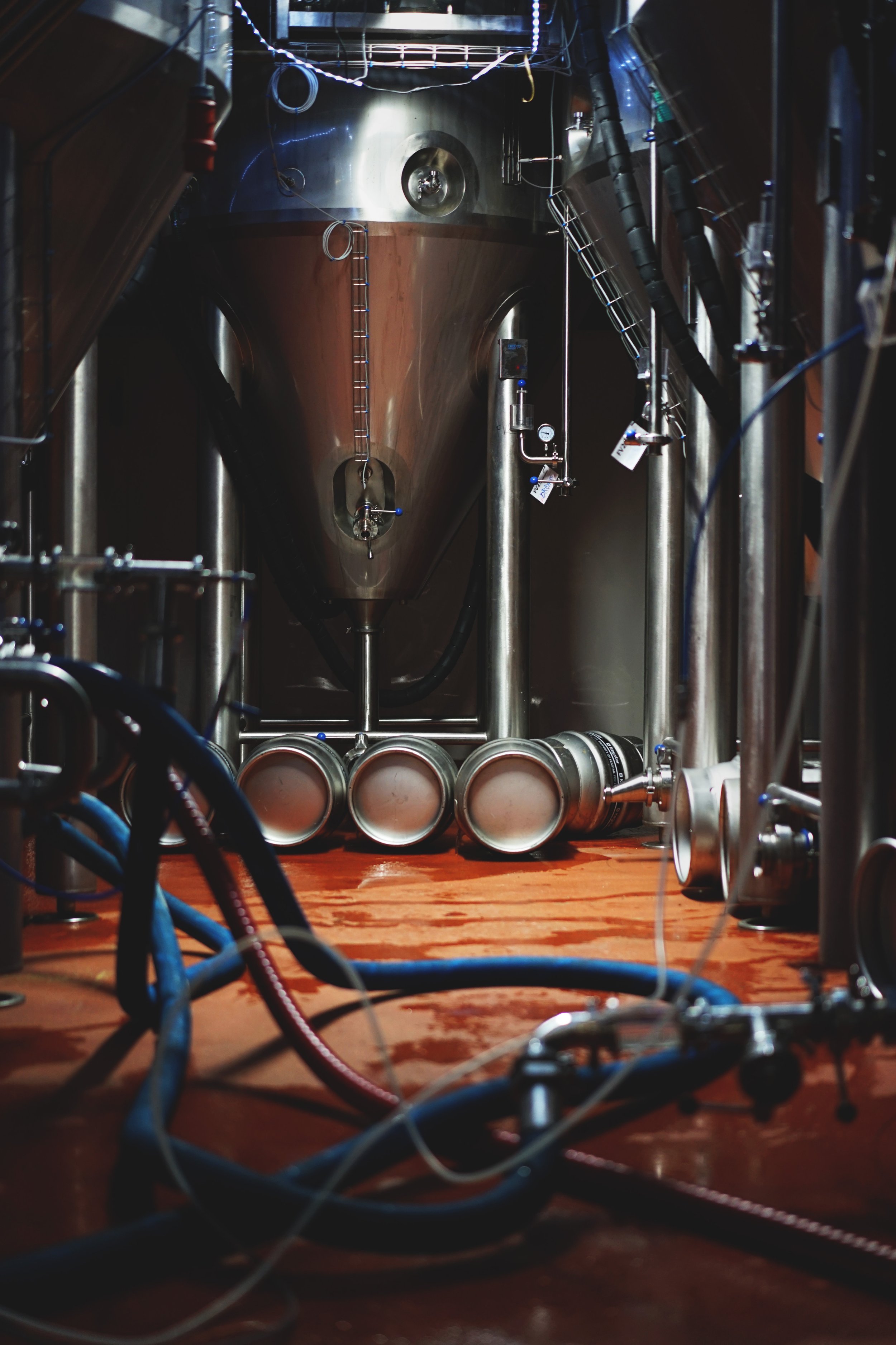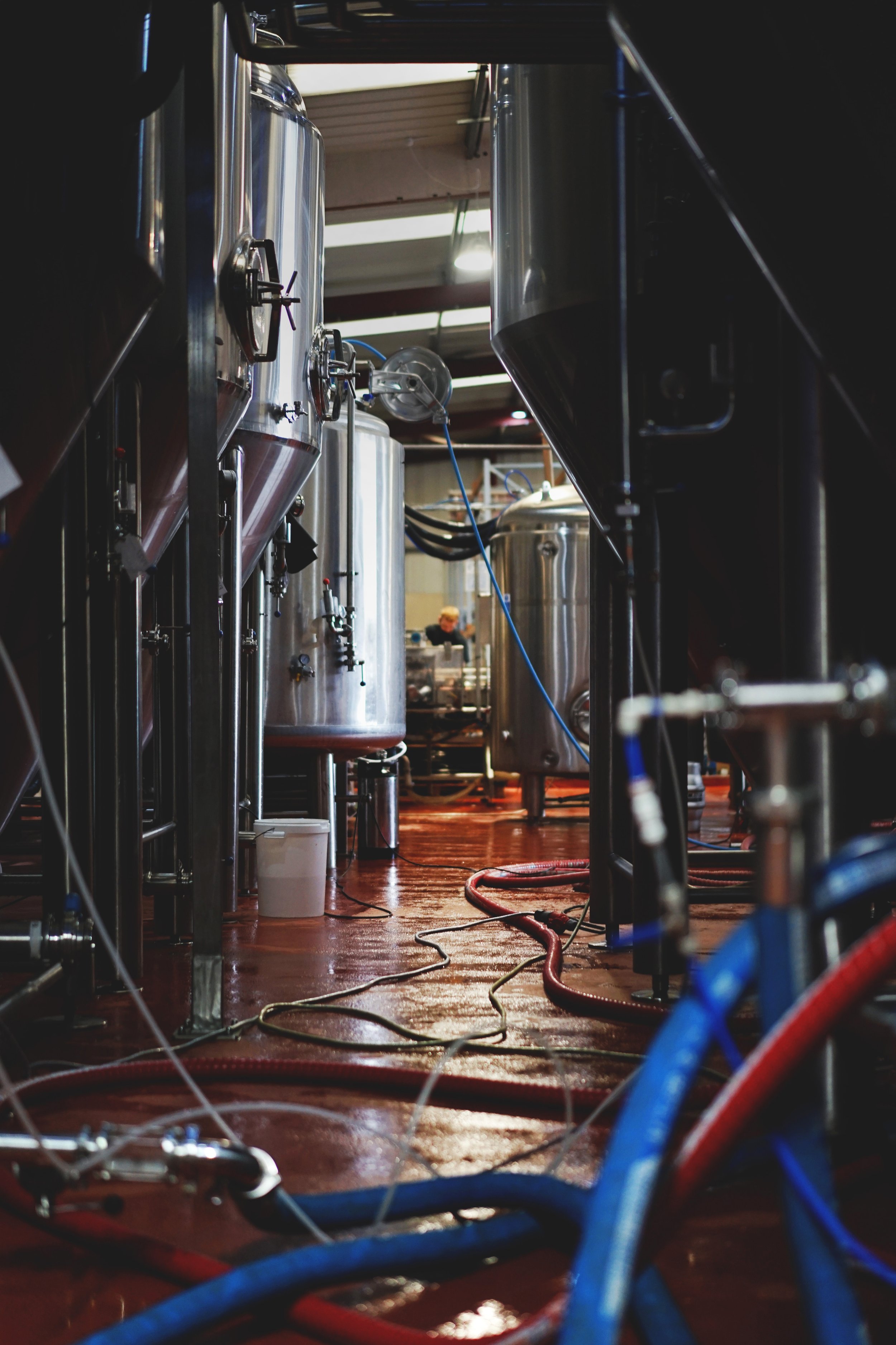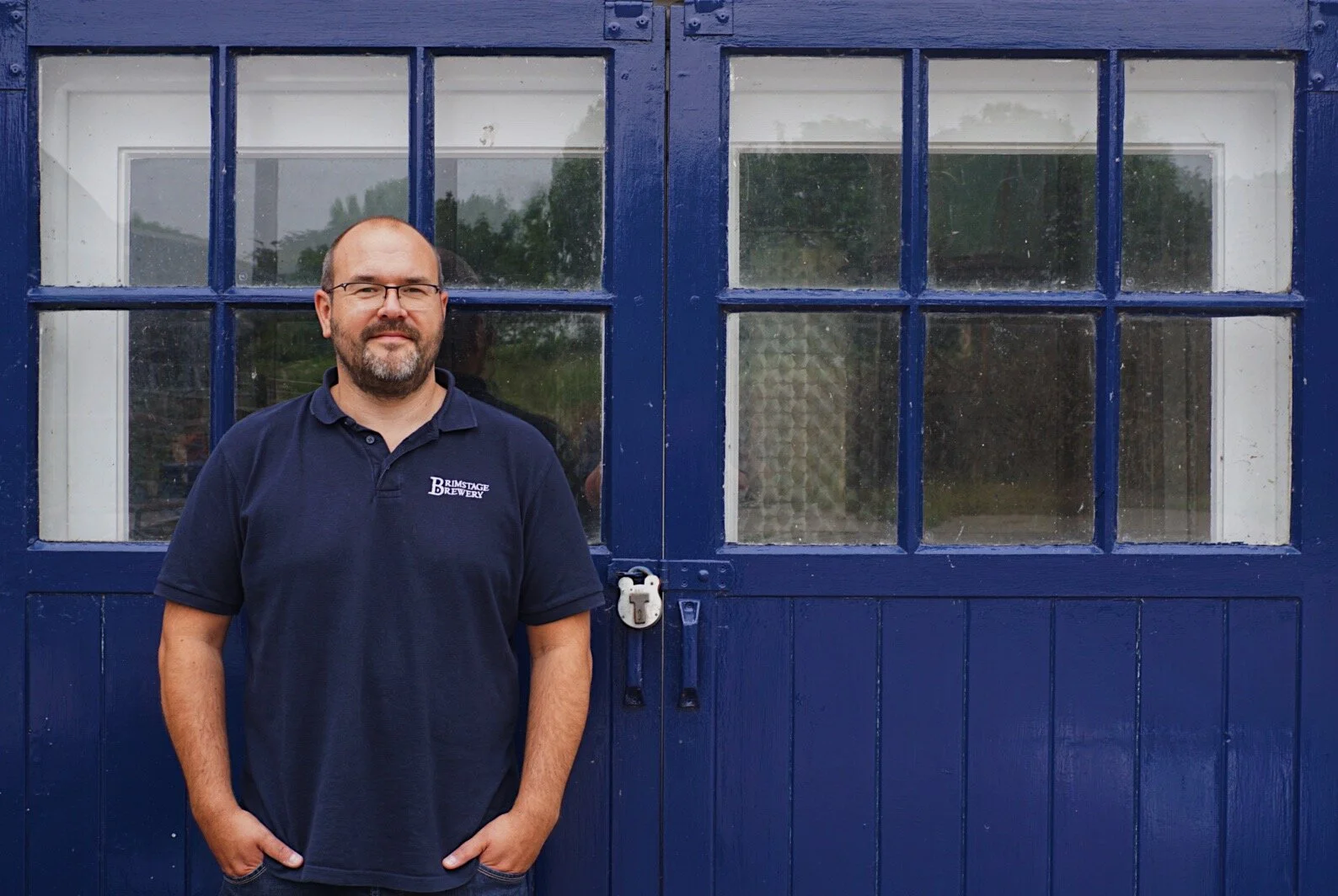Yorkshire State of Mind — A Conversation with Wayne Smith and Lee Grabham of Brew York
Following what has been one of the most challenging periods on record for the hospitality sector, it’s gratifying to hear about businesses that have managed to ride the waves of uncertainty, by adapting and innovating as rapidly as possible.
One example is Brew York, a York-based brewery and taproom that has seen year-on-year growth since it was founded back in 2015 by friends Wayne Smith and Lee Grabham. Its story began in a familiar fashion when the two friends started chatting about homebrewing at a friend’s barbecue. From then on their shared passion for brewing their own beer continued to grow, until they eventually started to discuss opening their own brewery.
Photography by Matthew Curtis
Fast forward six years and not only have they made the dream a reality, they have expanded more than they ever thought possible. This includes a swish new brewing site in Osbaldwick, three miles outside of York city centre, two bars (including one in nearby Leeds), and a drinking and dining space at their original York site called the Brewers Yard, located in the city’s historic Walmgate area.
Despite these exciting developments, however, it’s important to remember that Brew York’s success story is all about the beer, and there is plenty to choose from: beyond its expansive core range, the brewery also produces limited and seasonal releases, as well as collaborations with other breweries including Aberdeen’s Fierce Beer, and fellow Yorkshire brewery Vocation Brewery. You can expect quirky names and bags of flavour in beers like Goose Willis (a refreshing gooseberry fool sour) and Juice Forsyth (a fruity IPA with pineapple, passionfruit & mango.)
My personal favourite has to be Tonkoko, a silky, easy-drinking milk stout. On tasting, it’s obvious why its nickname within the brewery is “liquid Bounty”—the brewery uses a custom built infusion vessel to infuse the beer with tonka beans, coconut, Madagascan vanilla and Belgian cacao nibs. Arguably even tastier is Imperial Tonkoko, a more decadent version of the original, but with double the coconut, cacao, vanilla, and tonka, and ramped up to 7.5% ABV.
It’s fair to say that Brew York has enjoyed an impressive ascent to success within a relatively short time. Fortunately the team were also able to quickly pivot during the early stages of the pandemic, by selling more canned beers and hosting virtual tastings on YouTube, helping to keep its customers engaged through a challenging period for breweries and hospitality businesses alike.
Wayne Smith (L) and Lee Grabham (R)
I caught up with Brew York’s founders, Wayne and Lee, to find out more about their journey so far, and to hear about their ambitious plans for the future.
***
Camille Allcroft: How did the idea come about to open your own brewery, and how do you feel about what you have achieved so far?
Wayne Smith: I’d been doing some home brewing in my shed and I went to a friend’s barbecue, and took some of my homebrew with me. Lee happened to be at the barbecue and I had some spare brewing equipment, so I gave that to him after we chatted about homebrewing. Lee is super competitive, so he wasn’t happy only using the equipment I gave him and he went out and bought every piece of kit that he could find! We both became passionate homebrewers and we started brewing together and taking part in competitions.
I was working for a construction company at the time and I spoke to my boss about the possibility of voluntary redundancy, because there might be an opportunity for me to do something I was truly passionate about. Lee was working at Aviva and they were restructuring, so he put his name forward for voluntary redundancy too. You spend your life at work, so we both figured we might as well be doing something we love and those kinds of opportunities don’t come around very often.
CA: Did you have any hesitancy about opening your own brewery once you were fixed on the idea, or did you follow your intuition and simply feel that it was time to go for it?
Lee Grabham: We had discussed it so many times, saying “oh wouldn’t it be great if we did it.” I can remember one day, we were sitting in a beer garden having the same conversation again and I asked Wayne “are you prepared to spend the rest of your life wondering ‘what if’, or shall we actually do this?”
CA: How did you go about setting up, once you had decided to make the idea a reality?
WS: We invested our own savings, used the money from our redundancies and we also went cap in hand to our families and asked them to support us on the venture. The biggest help we got from our friends and family was in 2015, ahead of our official launch in April 2016, when the first beers were brewed and the taproom opened. At first it was Lee and myself doing absolutely everything: brewing, and then running the taproom in the evenings. We were getting to the stage where we were burning ourselves out. Our friends and family were amazing, they stepped in and helped us in exchange for beer, which was invaluable for us as a start-up business.
CA: Were there any moments in those early days when you sat back and thought “what have we done?” or did you immediately take to running the business without looking back?
WS: I would like to say that we took to it like ducks to water, but there was undoubtedly an element of naivety too, because we just threw ourselves into it and thought, “even if we don’t know how to do this, we are going to have to work it out.” Thankfully, we did work most of it out!
CA: You are obviously very driven, do you think that unwavering determination is the secret to your success?
LG: I think that our passion for what we do and towards running the business overall is a big key to our success. Our attitude even comes across in our style of branding, because our chief aim is to have fun and the people who work alongside us sense that, and the enthusiasm rubs off on them. It’s been such an enjoyable ride so far. When we were first brewing, the feeling of having the customer standing in front of us giving us feedback was incredibly gratifying.
CA: You invested in a new canning line shortly before lockdown first began last year, was that a conscious decision to adapt your business due to the unfolding situation?
WS: We had already been planning our brewery expansion at that stage, but we knew the canning line we had at that time was not quite up to scratch for what we needed. We were about to buy a new canning line and an opportunity arose for one with better specifications that could do sixty cans per minute, which at the time was over and above what we needed to produce. We didn’t even know how we were going to fit it into our small brewery site, but we adapted it and made a few changes so that we could squeeze it in and within a year we were able to move it to the new site.
““We just threw ourselves into it and thought, ‘even if we don’t know how to do this, we are going to have to work it out.’””
Once the pandemic hit, buying that canning line turned out to be one of the best decisions we have ever made, although at the time it seemed like a tricky manoeuvre because it was a bigger investment than we had planned on making. As it transpired, the timing couldn’t have been better because when lockdown commenced, all our tanks were full and we were expecting to put all that beer into cask and keg. Thanks to the new canning line, we were able to put it into cans and take it to market that way.
CA: How have you personally found the pandemic as a whole?
WS: It has been a really strange position for us to be in, because we have not wanted to make a big deal out of the fact that we managed to expand during the pandemic. Some of our friends in the industry really struggled because they were not in a position to take advantage of canning. One of the things we did was to put our old canning line up for sale as soon as we could, and while some businesses out there were taking advantage of the situation, we sold our canning line at a very reasonable price because we wanted to try and help out other breweries. All the things we were hoping to achieve, we eventually managed despite the situation so we are very lucky.
CA: You secured an investment of £1.5 million for expansion to your new site and created 16 more jobs in the process. Were you pleased to be able to expand during these uncertain times?
LG: When we revealed the investment news, many people interpreted it as that we’d sold part of the business, but that’s not what we did at all. Because of the pandemic, it was slightly easier to access funding than it had been previously, so we took advantage of some loans and European grants which became available to create a “pot” of £1.5 million, which we then invested back into the business. Wayne and I are still the only shareholders and we want to be very clear about that, because we received a bit of bad press at the time for something we had not even done!
During the five and a half years we’ve been going, we have been fortunate that the business has done reasonably well and we have constantly invested back into it, but we reached a point where in order to reach the next level of expansion, we needed to secure some funding. Although it seems strange to call anything a “benefit” of the pandemic.
CA: Your new site in Osbaldwick has increased your production capacity hugely, are you confident that demand will continue to rise?
LG: The installation at the new site is designed in a modular fashion, so it’s easy to add extra tanks on and we are hoping to explore that idea, possibly sooner than we expected. We’re in the fortunate position of not having any tanks available, now that the pubs have reopened we are trying to catch up on cask beer stock—it may settle down, but demand is currently very high.
CA: Despite all the challenges the pandemic has presented, it seems like you have thrived nevertheless.
WS: We have undoubtedly been very fortunate, but in March last year I can recall sleepless nights, because we have quite a lot of employees and we didn’t want years of hard work to be thrown away overnight. It was only when the government support was announced, that we realised we would actually be able to get through it, [despite] the market and demand changing completely overnight because people wanted to drink at home. Our team was amazing and they came back from furlough relatively quickly, our production team in particular only had a couple of weeks away.
CA: Since lockdown has eased, you have opened your new Brewer’s Yard space at your York site, offering an outdoor drinking and dining space with Asian-inspired food from Yuzu Street Food, how’s that going?
LG: We partnered with Yuzu just before the lockdown kicked in at our first bar outside of York, which we got about two months of use from before we had to close! Our new Brewer’s Yard used to be a car park and we are pleased to have a new casual space where people can enjoy some food and beers outside. Yuzu’s food includes things like bao buns, dumplings, chicken wings and katsu curries, which goes amazingly with beer!
CA: You’ve also recently opened a bar on New Briggate in Leeds, why did you choose Leeds in particular?
WS: We’ve always had a great relationship with Leeds as a city. Leeds International Beer Festival was the first beer festival we ever attended as a brewery and we had an amazing reception there, so we have attended every year since. Leeds is not that far from York and we knew that we had a relatively strong following there, so it made sense for us to open a bar there as it is close enough for us to keep an eye on the venue and make sure that it is running how we like. It took a long time to get the lease signed and three days later we went back into lockdown again, but we suspected that would happen at the time. We partnered with Yuzu there too and they started doing delivery straight away, which helped to generate an income for the venue and established our reputation.
CA: What does the future hold for Brew York?
LG: People say it’s great what we’ve done, but Wayne and I generally don’t reflect on that; we are always looking at what is in front of us rather than what is behind us. We do have ambitions for the future. We want to increase our bar portfolio and we got close to signing for a place in Manchester, which fell through. Some other great breweries have recently opened in that market too, but we are still keeping an eye on what plays out there and there are other areas we are looking at too, predominantly in the north for now.
WS: It’s amazing to have a city centre taproom and our new main brewery site only a fifteen minute drive away and we have a lot of space there which will be good for hosting events and festivals. We also want to do a weekend taproom, so we are going through a planning application at the moment, and add that to our site in Osbaldwick.
CA: As a business Brew York seems very sociable and approachable, was it a conscious decision when you opened to take an unstuffy approach to running your brewery?
LG: When we opened we wanted to make our brewery as interactive as possible for people and to teach them about beer and the enjoyment of beer and most of all to make it fun.
At the start of lockdown, one of the things we really missed was chatting to customers, so we quickly decided to start doing live tastings on YouTube, which was cool, and from a selfish perspective it gave us a chance to still have that interaction. When we started up with the tastings we did about six beers for each one, we’re quite big guys so we like to think that we can hold our beer pretty well, although if you watch the YouTube tastings back you might disagree!
We used to do the tastings on a Friday evening and it was great to be able to have that rapport with customers and to receive their feedback. Once the restrictions were lifted slightly, we were able to get a live audience in to do some small tastings. To be able to see the whites of people’s eyes again was so enjoyable rather than talking to a camera! We have a packed calendar of beer festivals this year and other than that, we are just delighted to be getting back to doing what we love and bringing great beer to the people.










